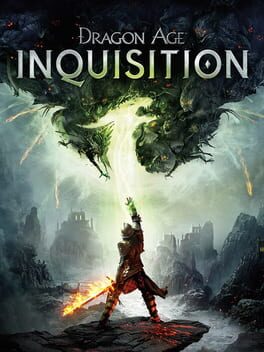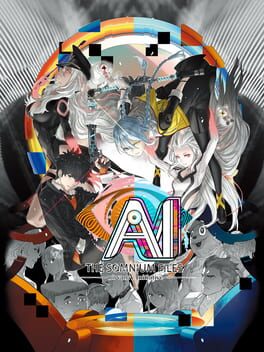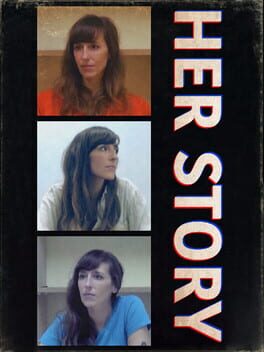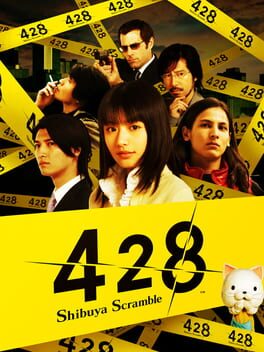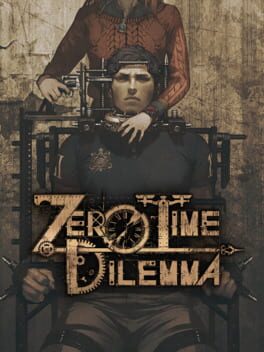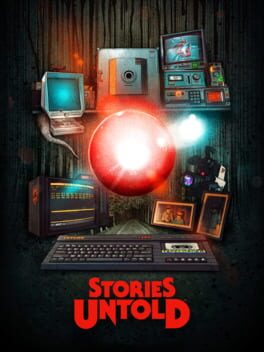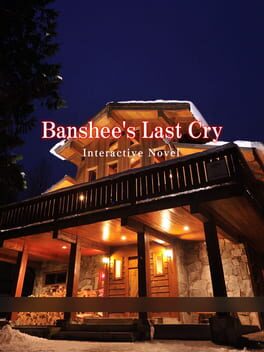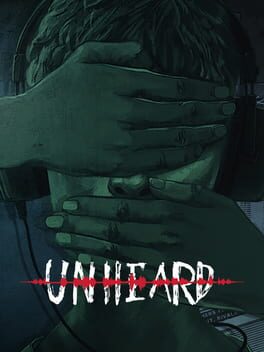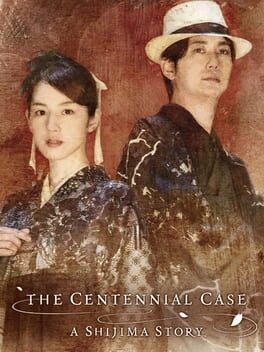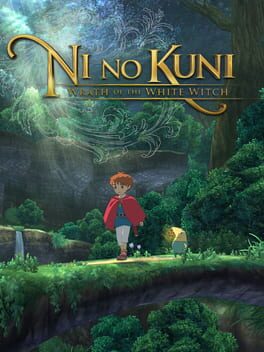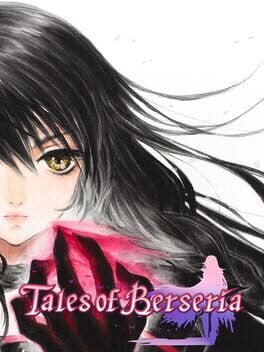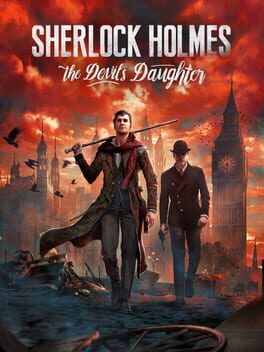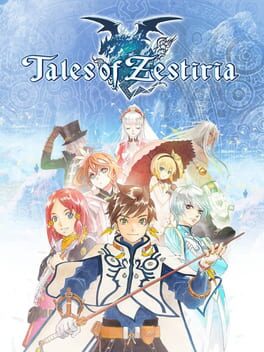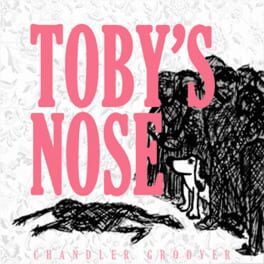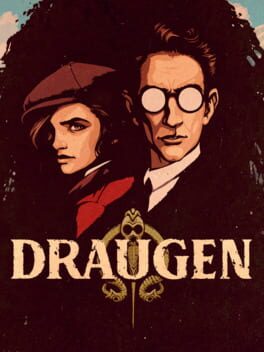bellwoods
One of the best hidden object games out there. You use a magical skull to spot hidden glowing "shards" across the landscape, then run around the semi-open-world map collecting them through light platforming and combat. Your reward for collecting all the shards is greatly increased elemental resistance--useful if you choose to pursue the game's optional sidequest, which is about closing demonic rifts or something.
2015
I managed to discourage myself from engaging with Her Story for quite a while, because I'd seen many people relate that they'd stumbled upon the solution "early" after having a cunning insight or lucky guess. After playing it, I feel like this was totally intentional: that the game paces itself, so to speak, such that any order you attack it will produce a viable story structure and "aha!" moments. It's not stingy with its clues, instead trusting the player to self-pace. The more I think about it, that's a really impressive magic trick.
My wife and I played it together--probably the best way to play it, really, in a group tossing out keywords. We got all the key scenes and the prompt to finish having seen (iirc) just under half the clips, then watched them again in chronological order for full context. (Appreciate that this was not a requirement for basic completion.)
In a story like this, character work is make-or-break, and Viva Seifert's performance carried it. I really don't expect to come out of a mystery like this feeling strongly about the characters, but here I really did. The subgenre turn might not be for everyone, but it worked for me.
My wife and I played it together--probably the best way to play it, really, in a group tossing out keywords. We got all the key scenes and the prompt to finish having seen (iirc) just under half the clips, then watched them again in chronological order for full context. (Appreciate that this was not a requirement for basic completion.)
In a story like this, character work is make-or-break, and Viva Seifert's performance carried it. I really don't expect to come out of a mystery like this feeling strongly about the characters, but here I really did. The subgenre turn might not be for everyone, but it worked for me.
This review contains spoilers
Man, I really, really wanted to like this game, given its reputation in the genre, but I came away disappointed. Blame heightened expectations, perhaps, but when you're playing a game that infamously received a perfect score, the imperfections stand out: the drawn-out endgame and associated difficulty spike, the numerous fat jokes, the stereotypes about Southwest Asia, losing your only main route girl at 5 p.m...
I can still see why it had such a profound influence on VNs. The gameplay loop is fun and innovative, hopping between narratives to facilitate serendipitous coincidences and chance encounters that lead to a good outcome. There are a couple of great twists and brilliant brick jokes. But I just didn't like the story once it turned serious. Minorikawa's route was easily my favourite (Run Lola Run for writers) and it's the one with the least connection to the overarching plot.
I can still see why it had such a profound influence on VNs. The gameplay loop is fun and innovative, hopping between narratives to facilitate serendipitous coincidences and chance encounters that lead to a good outcome. There are a couple of great twists and brilliant brick jokes. But I just didn't like the story once it turned serious. Minorikawa's route was easily my favourite (Run Lola Run for writers) and it's the one with the least connection to the overarching plot.
It's a miracle that the third game in the trilogy managed to get made, so I suppose I'm glad that Zero Time Dilemma exists at all. An imperfect ending with some dangling plot threads is better than no ending. There are some memorable moments (though much of what I liked here was done better in Nirvana Initiative), and C-team's "divorced polycule" dynamic was a strong point.
There is one big difference from the previous entries that I want to highlight, because it's where the game ultimately doesn't work for me. In 999 and VLR, the puzzle rooms are honest, a kind of no-man's land. When they're not 100% safe, you at least understand Zero to be playing fair. There is the occasional scare or corpse to put you on edge, the fear that something might be waiting in the next room, but success never puts you in any real danger. If some of your companions have serial killer tendencies, they'll nobly put them aside while you work together on solving the soup cans. And if you complete the room successfully, you are rewarded with keys, passwords, useful items, information.
ZTD turns this formula on its head: your "reward" for completing the room tends to be your beloved characters getting machine-gunned. Or gassed. Or incinerated. Or hell, blowing up the entire facility. It's firmly operating in the Saw school of puzzle design: less "player epiphany" than "player antipathy". In another game, this might have been an interesting design choice. In a Zero Escape game, I found it disappointing. ZTD circles back to the very formula 999 was subverting, but the reason I liked the latter game was because I consider that formula to be misanthropic and rather dull. In other words, it's a fine enough game taken on its own terms, but as a direct sequel, it can't be taken on its own terms.
There is one big difference from the previous entries that I want to highlight, because it's where the game ultimately doesn't work for me. In 999 and VLR, the puzzle rooms are honest, a kind of no-man's land. When they're not 100% safe, you at least understand Zero to be playing fair. There is the occasional scare or corpse to put you on edge, the fear that something might be waiting in the next room, but success never puts you in any real danger. If some of your companions have serial killer tendencies, they'll nobly put them aside while you work together on solving the soup cans. And if you complete the room successfully, you are rewarded with keys, passwords, useful items, information.
ZTD turns this formula on its head: your "reward" for completing the room tends to be your beloved characters getting machine-gunned. Or gassed. Or incinerated. Or hell, blowing up the entire facility. It's firmly operating in the Saw school of puzzle design: less "player epiphany" than "player antipathy". In another game, this might have been an interesting design choice. In a Zero Escape game, I found it disappointing. ZTD circles back to the very formula 999 was subverting, but the reason I liked the latter game was because I consider that formula to be misanthropic and rather dull. In other words, it's a fine enough game taken on its own terms, but as a direct sequel, it can't be taken on its own terms.
2017
Moments of atmospheric brilliance ("you" getting closer and closer was clever and genuinely had me on the edge of my seat), but ultimately drives full-throttle down a frame-plot road that's been traversed by many other games, and more elegantly. It's not bad, just... overdone. In the IF genre alone you've got Photopia, Shade, and SPY INTRIGUE, off the top of my head.
Anyway, there are already reviews dissecting the ending, so I'll just talk about my personal bugbear: text parser pastiches need to stop using "USE". Actual parser games don't usually use "USE"; that's a menu-based adventure game thing. You cannot use ye flask. Stories Untold has the aesthetics of a Commodore 64 game, but the play logic is totally unlike any text parser game, in a way that I found outright distracting. I don't mean the verb selection menu--that's a smart way of levelling the playing field for people who haven't engaged with the genre--but things like AROUND being a noun which you can combine with GO or LOOK. You might say (perhaps the devs said) that real parser games are clunky, and nobody actually wants to play one, and the community of people who do play them in the 2020s is quite small. Sure. 100% fair. But if that's the reasoning... why make one? Why set this game in the 80s at all?
Anyway, there are already reviews dissecting the ending, so I'll just talk about my personal bugbear: text parser pastiches need to stop using "USE". Actual parser games don't usually use "USE"; that's a menu-based adventure game thing. You cannot use ye flask. Stories Untold has the aesthetics of a Commodore 64 game, but the play logic is totally unlike any text parser game, in a way that I found outright distracting. I don't mean the verb selection menu--that's a smart way of levelling the playing field for people who haven't engaged with the genre--but things like AROUND being a noun which you can combine with GO or LOOK. You might say (perhaps the devs said) that real parser games are clunky, and nobody actually wants to play one, and the community of people who do play them in the 2020s is quite small. Sure. 100% fair. But if that's the reasoning... why make one? Why set this game in the 80s at all?
2014
Played this because (a) it's a murder mystery and (b) I heard it was an influence for 999, and it certainly has a similar spirit. The game relies on being replayed. I made an incorrect deduction about who the murderer was and stumbled into a slasher horror piece. A replay knowing who they were meant that everyone was unharmed and I came out looking like a genius. There is an idea of drawing deductions from information you gained in 'bad routes' that the Zero Escape series draws on to its literal extreme. A fun, not particularly long investigation.
The iOS release makes some very odd localization choices, starting with changing kamaitachi to banshee and ending with changing the graphics/photos and setting to a ski lodge in Canada. Seems another thing it has in common with 999 is the Ship of Theseus problem--at what point does it become a different game?
The iOS release makes some very odd localization choices, starting with changing kamaitachi to banshee and ending with changing the graphics/photos and setting to a ski lodge in Canada. Seems another thing it has in common with 999 is the Ship of Theseus problem--at what point does it become a different game?
2019
DEVOURED this. I was a little leery going in, as Unheard looked like a Jumpscares Horror Game (and the game certainly leans into this implication to keep you on edge). In fact, it is a mini-mysteries game with zero jumpscares and a really neat investigation mechanic. Similar to Telling Lies, but the conversation matching worked much better. (And you can skip through the audio, no less.) Each case involves a complicated series of intersecting gambits, with you having to follow handoffs, shuffles, and true identities. I could have done without the "evil psych ward" stuff, and the plots weren't exactly deep, but the basic gameplay was so fun that I wish the game were longer.
Apparently the devs aren't planning to release the other two DLCs in English, as they are too based in Chinese culture to be localized like the base game is. Which is a shame, really--I would happily play it translated but unlocalized.
Apparently the devs aren't planning to release the other two DLCs in English, as they are too based in Chinese culture to be localized like the base game is. Which is a shame, really--I would happily play it translated but unlocalized.
An early footnote in The Centennial Case outlines possible tricks in detective fiction, including the "narrative trick"--misleading the reader via the narrative delivery of prose writing, e.g. unreliable narrators--but notes that such tricks are considered "impossible in films and TV". Naturally, anyone in the game's target audience (the type of mystery fan who reads the sleuth spotlights at the back of Detective Conan volumes) may wonder if this FMV game will try its hand at inventing one. May build a few logic hexagons, so to speak, about what could be done with this format. I did, and the story still threw me just far enough off the scent to be surprised. They accomplished their goal in a pretty clever way, so kudos to them.
Mind, we are talking about a type of trick that hasn't been done in films and TV. Exploiting the medium for narrational meta-tricks is nothing new to video games and VNs. You can find effective uses of these twists in works from Umineko to Undertale to Kotaro Uchikoshi's entire oeuvre. And that's my sticking point: Centennial Case doesn't seem all that interested in being a video game. The interactive logic board segments are the weakest parts. They're similar to Sherlock Holmes: Crimes and Punishments' deduction system but more mechanically obtuse (albeit more aesthetically pleasing). My best interpretation of what was going on here is a simulation of the kind of wild theorizing a reader performs while engaging with a mystery novel, but I didn't have a consistent sense of what these logic chains were supposed to represent. They certainly aren't deductions. "Clues" can be evidence OR possible answers. The resulting hypotheses also often fell prey to sloppy wording, or possibly muddy translation (e.g. whatever distinction they were driving at with "the culprit burned the evidence" vs. "the culprit set a fire to burn evidence"). Basically, while I didn't dislike the logic system nearly as much as some people, I didn't feel like it added much. I would've liked the story equally if it had been a TV series.
That all sounds kind of negative, so I want to say, I did like Centennial Case. A lot. It's full of references to the history of detective fiction, situated in historical context, and that stuff is like catnip to me. While most of the cases were nothing to write home about, they were solid, and I had plenty of fun with them. The epilogue was great, and I loved Josui. Add a new Character Of All Time to the list, lads.
Mind, we are talking about a type of trick that hasn't been done in films and TV. Exploiting the medium for narrational meta-tricks is nothing new to video games and VNs. You can find effective uses of these twists in works from Umineko to Undertale to Kotaro Uchikoshi's entire oeuvre. And that's my sticking point: Centennial Case doesn't seem all that interested in being a video game. The interactive logic board segments are the weakest parts. They're similar to Sherlock Holmes: Crimes and Punishments' deduction system but more mechanically obtuse (albeit more aesthetically pleasing). My best interpretation of what was going on here is a simulation of the kind of wild theorizing a reader performs while engaging with a mystery novel, but I didn't have a consistent sense of what these logic chains were supposed to represent. They certainly aren't deductions. "Clues" can be evidence OR possible answers. The resulting hypotheses also often fell prey to sloppy wording, or possibly muddy translation (e.g. whatever distinction they were driving at with "the culprit burned the evidence" vs. "the culprit set a fire to burn evidence"). Basically, while I didn't dislike the logic system nearly as much as some people, I didn't feel like it added much. I would've liked the story equally if it had been a TV series.
That all sounds kind of negative, so I want to say, I did like Centennial Case. A lot. It's full of references to the history of detective fiction, situated in historical context, and that stuff is like catnip to me. While most of the cases were nothing to write home about, they were solid, and I had plenty of fun with them. The epilogue was great, and I loved Josui. Add a new Character Of All Time to the list, lads.
2016
There are the 3-star games that are "just okay", and 3-star games that average out from epic highs and equally epic lows. This is very much the latter. Loved most of the plot, best party in a Tales game bar none, and Velvet is a great protagonist. But it's also bogged down by an ending I didn't care for, oversexualized female character designs, and numerous mechanical annoyances.
The combat system is much-maligned, even (especially) among Tales veterans, who often find it "too easy" and "button mashing". This was also my opinion at first, but after engaging with the systems for what they are (instead of just "this is not like other Tales games"), I ended up finding a lot of joy in Switch Blasts, Break Souls, Mystic Arte chains, and derivative artes. I mostly played as Eleanor, who has tremendous AoE and a fun capacity to juggle enemies, and any time I was inflicted with a status effect I got rid of it by Switch-Blasting to someone else. Swapping in and out and perpetually changing playstyles made things more enjoyable and chaotic.
I still found the vast majority of the bosses quite easy-- way too easy, really, like they weren't scaled to Hard difficulty. I'm not sure if there is a way to scale it to a challenging sweet spot, to be honest--the way the combat works creates a snowball effect where the more staggers you (or the enemy) inflict, the better combos you can pull off. That meant that mobs were almost invariably more challenging than bosses, and most of the difficulty with bosses came from not being able to collect souls as easily, and having to chip away at their health until you perform one big combo. Bit repetitive. I don't think it's a coincidence that the final boss fight is the only dual boss fight (as far as I remember) and also one of the only tough ones.
The combat system is much-maligned, even (especially) among Tales veterans, who often find it "too easy" and "button mashing". This was also my opinion at first, but after engaging with the systems for what they are (instead of just "this is not like other Tales games"), I ended up finding a lot of joy in Switch Blasts, Break Souls, Mystic Arte chains, and derivative artes. I mostly played as Eleanor, who has tremendous AoE and a fun capacity to juggle enemies, and any time I was inflicted with a status effect I got rid of it by Switch-Blasting to someone else. Swapping in and out and perpetually changing playstyles made things more enjoyable and chaotic.
I still found the vast majority of the bosses quite easy-- way too easy, really, like they weren't scaled to Hard difficulty. I'm not sure if there is a way to scale it to a challenging sweet spot, to be honest--the way the combat works creates a snowball effect where the more staggers you (or the enemy) inflict, the better combos you can pull off. That meant that mobs were almost invariably more challenging than bosses, and most of the difficulty with bosses came from not being able to collect souls as easily, and having to chip away at their health until you perform one big combo. Bit repetitive. I don't think it's a coincidence that the final boss fight is the only dual boss fight (as far as I remember) and also one of the only tough ones.
Fever dream of a game. I played Devil's Daughter because it came bundled with Crimes & Punishments for $50 cheaper than either game on its own. Despite being bundled with C&P, it's actually a direct sequel to Testament, a game I have not played, in which Holmes and Watson have adopted Moriarty's daughter Katelyn.
Not that the chain of sequels and prequels really matters, because Devil's Daughter's biggest stylistic influence isn't either of its predecessors, but Guy Ritchie's Holmes films. Which is fine, if you liked them. Though I can't understate the uncanny valley effect of seeing C&P characters alongside Watson's Jude Law glow-up and Holmes's dangling suspenders.
I'm genuinely unsure if I enjoyed this or not, let alone how to rate it. There are a truckload more QTEs than C&P (including the entire final segment), but they play better. Cases 1 and 4 are good (or at least, good fanfiction of the Ritchie movies)--case 4 in particular I enjoyed far more than anything in C&P. The domino effect deduction was great fun, and it didn't overstay its welcome. On the other hand, case 2 mirrors Sign of the Four down to the racist elements, and the treatment of Alice is just awful across the board (at one point you can backhand her).
Mostly, I was left baffled. A sequence I can only describe as Assassin's Creed: Wiggins (featuring a "lung disease" meter) had my wife in hysterics. At one point, Sherlock Holmes is hunted for sport. There's a metallurgy rhythm game, a lawn bowls tournament, and a sewer platforming level. And the final case is... how do I even describe it. It's directed like a "journey to the centre of the mind" dream sequence, but for no apparent reason, because all the events are supposed to be actually happening. I felt like I was playing an improvised children's bedtime story. When the case ended abruptly after perhaps an hour, I turned to my wife and whispered, "What the fuck?"
Not that the chain of sequels and prequels really matters, because Devil's Daughter's biggest stylistic influence isn't either of its predecessors, but Guy Ritchie's Holmes films. Which is fine, if you liked them. Though I can't understate the uncanny valley effect of seeing C&P characters alongside Watson's Jude Law glow-up and Holmes's dangling suspenders.
I'm genuinely unsure if I enjoyed this or not, let alone how to rate it. There are a truckload more QTEs than C&P (including the entire final segment), but they play better. Cases 1 and 4 are good (or at least, good fanfiction of the Ritchie movies)--case 4 in particular I enjoyed far more than anything in C&P. The domino effect deduction was great fun, and it didn't overstay its welcome. On the other hand, case 2 mirrors Sign of the Four down to the racist elements, and the treatment of Alice is just awful across the board (at one point you can backhand her).
Mostly, I was left baffled. A sequence I can only describe as Assassin's Creed: Wiggins (featuring a "lung disease" meter) had my wife in hysterics. At one point, Sherlock Holmes is hunted for sport. There's a metallurgy rhythm game, a lawn bowls tournament, and a sewer platforming level. And the final case is... how do I even describe it. It's directed like a "journey to the centre of the mind" dream sequence, but for no apparent reason, because all the events are supposed to be actually happening. I felt like I was playing an improvised children's bedtime story. When the case ended abruptly after perhaps an hour, I turned to my wife and whispered, "What the fuck?"
2015
This review contains spoilers
This game has a divisive reputation among Tales fans, to say the least, so I did my best to come into Zestiria with an open mind, but I can't say I came away with a positive impression.
I was mainly interested in playing this as a companion to Tales of Berseria, Zestiria's prequel. Berseria's ending is bittersweet, leaving open the hope that someone can fix the world's fate in the future, i.e. the plot of Zestiria. If you want to follow up on these unresolved threads, it seems reasonable to play these games in chronological order.
Unfortunately, after Berseria, the themes of this game left a bad taste in my mouth. Berseria does a lot to humanize demons, treating generic fantasy enemies as people with inner lives. Zestiria plays the same fantasy tropes straight: while it might seem happier that Sorey can "purify" hellions rather than killing them (usually...), the hellions we see are either mindless monsters or innately wicked. It seems like none of the lessons from Velvet's time really stuck around in this world.
Furthermore, Artorius, Berseria's Shepherd, is... well... a fascist. He's obsessed with moral purity, blind obedience to a chosen hero, submission of the individual to the many, and the triumph of "reason" over emotion. His ideal society is one purged of social undesirables. And the Abbey is always depicted in stark shades of white. Berseria makes you root for its villain protagonists by saying "Hey, have you noticed that the hero's journey has some fascist subtext?" And granted, it's a critique of an entire genre, not just Zestiria. But after Artorius, I found it difficult to turn that interpretation off and invest myself in Sorey's journey at face value, as Zestiria's party try to keep Sorey from being tainted by negative emotions so he can stay pure, as he faces conflicts like "the ungrateful populace not immediately accepting his awesome powers and chosen one status". Those hero tropes (the ones that other game said were fascist) are played completely straight. It ends up coming off like Zestiria only exists so that Berseria can subvert it.
But I don't know that I would recommend playing Zestiria first, either. The beautiful environments and fun dungeon designs are plagued by clunky battle mechanics, sluggish AI, and perpetual camera issues. The cast are about as zesty as cornflakes--I cared about Edna and Zaveid by virtue of their connection to Eizen, but that's about it. Arguably this is as close as it comes to a Tales game with a canon gay relationship, and that still didn't save it. The plot is essentially Stranger in a Strange Land, if, when the protagonist arrived to enlighten humanity, the Martians all showed up like "Hey, you shouldn't give psychic powers to Alisha, you should give them to Rose. We all like Rose much better than Alisha. And she's smarter, too!" He couldn't even be bothered to die at the end.
I was mainly interested in playing this as a companion to Tales of Berseria, Zestiria's prequel. Berseria's ending is bittersweet, leaving open the hope that someone can fix the world's fate in the future, i.e. the plot of Zestiria. If you want to follow up on these unresolved threads, it seems reasonable to play these games in chronological order.
Unfortunately, after Berseria, the themes of this game left a bad taste in my mouth. Berseria does a lot to humanize demons, treating generic fantasy enemies as people with inner lives. Zestiria plays the same fantasy tropes straight: while it might seem happier that Sorey can "purify" hellions rather than killing them (usually...), the hellions we see are either mindless monsters or innately wicked. It seems like none of the lessons from Velvet's time really stuck around in this world.
Furthermore, Artorius, Berseria's Shepherd, is... well... a fascist. He's obsessed with moral purity, blind obedience to a chosen hero, submission of the individual to the many, and the triumph of "reason" over emotion. His ideal society is one purged of social undesirables. And the Abbey is always depicted in stark shades of white. Berseria makes you root for its villain protagonists by saying "Hey, have you noticed that the hero's journey has some fascist subtext?" And granted, it's a critique of an entire genre, not just Zestiria. But after Artorius, I found it difficult to turn that interpretation off and invest myself in Sorey's journey at face value, as Zestiria's party try to keep Sorey from being tainted by negative emotions so he can stay pure, as he faces conflicts like "the ungrateful populace not immediately accepting his awesome powers and chosen one status". Those hero tropes (the ones that other game said were fascist) are played completely straight. It ends up coming off like Zestiria only exists so that Berseria can subvert it.
But I don't know that I would recommend playing Zestiria first, either. The beautiful environments and fun dungeon designs are plagued by clunky battle mechanics, sluggish AI, and perpetual camera issues. The cast are about as zesty as cornflakes--I cared about Edna and Zaveid by virtue of their connection to Eizen, but that's about it. Arguably this is as close as it comes to a Tales game with a canon gay relationship, and that still didn't save it. The plot is essentially Stranger in a Strange Land, if, when the protagonist arrived to enlighten humanity, the Martians all showed up like "Hey, you shouldn't give psychic powers to Alisha, you should give them to Rose. We all like Rose much better than Alisha. And she's smarter, too!" He couldn't even be bothered to die at the end.
2015
Fascinating piece, funny while also considerably darker/more serious than I expected for a game about Sherlock Holmes's dog that references Great Mouse Detective. (Violent human and animal deaths, sex work, drug use, among other things. Also, the dog says fuck.) I initially struggled with how smelling worked, and was very grateful for "sharpened" (easy) mode and the various quality-of-life mechanics, because even with it on I often missed nouns that had been implemented. And what a staggering amount there are! It's impressive how far you can explore. Great example of what can be accomplished with conceptual-map style IF.
A few of the clues are tantamount to verbal pixel hunting--you really are expected to investigate EVERY noun, and there is one place in particular where several crucial clues are gated by a noun where there is no indication it leads to what it leads to. On the bright side, Holmes has already solved the case, so you can always brute-force a solution and then play again to try and ferret out some of those details (as I did).
A few of the clues are tantamount to verbal pixel hunting--you really are expected to investigate EVERY noun, and there is one place in particular where several crucial clues are gated by a noun where there is no indication it leads to what it leads to. On the bright side, Holmes has already solved the case, so you can always brute-force a solution and then play again to try and ferret out some of those details (as I did).
2019
I was briefly following this game's development (ages ago), because "sassy girl detective who gives off gay vibes" sounded like a very promising co-protagonist. In light of that, the end of act 2 certainly left me distraught, but perhaps not for the reasons intended.
Draugen does a great job of embodying you in the worldspace, but the story isn't as tight. The game revolves around two central mysteries. One is a grim, atmospheric tale of a town rotted by a family feud. The other is Silent Hill 2. This second plot majorly brings down the first, not only because it's been done better in a seminal PS2 game, but because your jerk of a protagonist cannot be bothered to care about the first one. (Kinda impressive, considering all the corpses littering the island.) Lissie's claim that they were "brought here to tell [the villagers'] story" is pretty rich, when the game can't even bother to do so.
Draugen does a great job of embodying you in the worldspace, but the story isn't as tight. The game revolves around two central mysteries. One is a grim, atmospheric tale of a town rotted by a family feud. The other is Silent Hill 2. This second plot majorly brings down the first, not only because it's been done better in a seminal PS2 game, but because your jerk of a protagonist cannot be bothered to care about the first one. (Kinda impressive, considering all the corpses littering the island.) Lissie's claim that they were "brought here to tell [the villagers'] story" is pretty rich, when the game can't even bother to do so.
